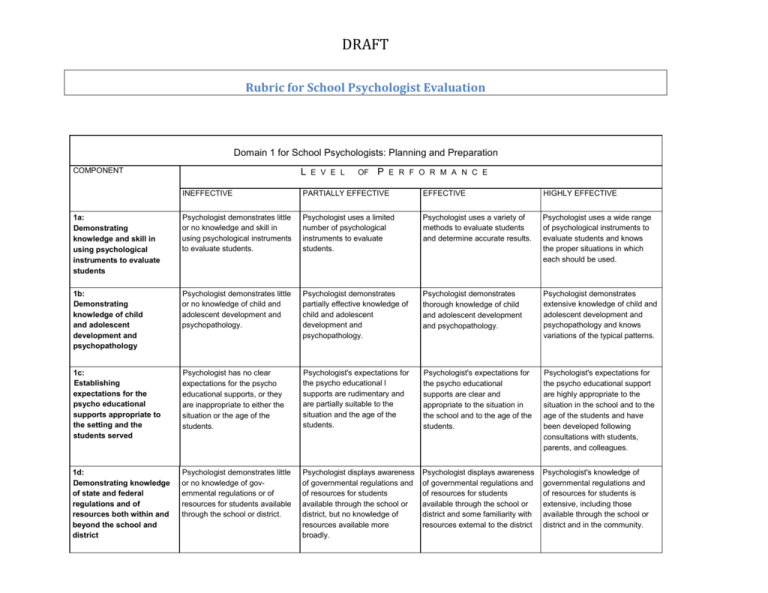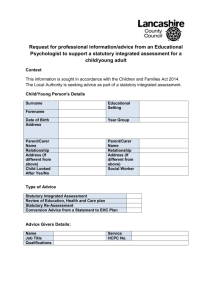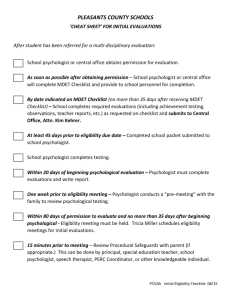Observation Psychologist Rubric
advertisement

DRAFT Rubric for School Psychologist Evaluation Domain 1 for School Psychologists: Planning and Preparation COMPONENT L E V E L OF P E R F O R M A N C E INEFFECTIVE PARTIALLY EFFECTIVE EFFECTIVE HIGHLY EFFECTIVE 1a: Demonstrating knowledge and skill in using psychological instruments to evaluate students Psychologist demonstrates little or no knowledge and skill in using psychological instruments to evaluate students. Psychologist uses a limited number of psychological instruments to evaluate students. Psychologist uses a variety of methods to evaluate students and determine accurate results. Psychologist uses a wide range of psychological instruments to evaluate students and knows the proper situations in which each should be used. 1b: Demonstrating knowledge of child and adolescent development and psychopathology Psychologist demonstrates little or no knowledge of child and adolescent development and psychopathology. Psychologist demonstrates partially effective knowledge of child and adolescent development and psychopathology. Psychologist demonstrates thorough knowledge of child and adolescent development and psychopathology. Psychologist demonstrates extensive knowledge of child and adolescent development and psychopathology and knows variations of the typical patterns. 1c: Establishing expectations for the psycho educational supports appropriate to the setting and the students served Psychologist has no clear expectations for the psycho educational supports, or they are inappropriate to either the situation or the age of the students. Psychologist's expectations for the psycho educational l supports are rudimentary and are partially suitable to the situation and the age of the students. Psychologist's expectations for the psycho educational supports are clear and appropriate to the situation in the school and to the age of the students. Psychologist's expectations for the psycho educational support are highly appropriate to the situation in the school and to the age of the students and have been developed following consultations with students, parents, and colleagues. 1d: Demonstrating knowledge of state and federal regulations and of resources both within and beyond the school and district Psychologist demonstrates little or no knowledge of governmental regulations or of resources for students available through the school or district. Psychologist displays awareness of governmental regulations and of resources for students available through the school or district, but no knowledge of resources available more broadly. Psychologist displays awareness of governmental regulations and of resources for students available through the school or district and some familiarity with resources external to the district Psychologist's knowledge of governmental regulations and of resources for students is extensive, including those available through the school or district and in the community. DRAFT 1e: Planning strategies to help support students in a regular education or special education setting to promote student success Psychologist's plan consists of a random collection of unrelated activities, lacking coherence or an overall structure. Psychologist's plan has a guiding principle and includes a number of worthwhile activities, but some of them don't fit with the broader goals. Psychologist has developed a plan that includes the important supports for the student in the setting.. Psychologist's plan is highly coherent and preventive and serves to support students individually, within the broader educational program. 1f: Designs a plan to review student’s academic progress in the recommended program. Psychologist does not have a plan to review the program or resists suggestions that such an evaluation is important. Psychologist has a rudimentary plan to review the psychology program. Psychologist's plan to review the program is organized around clear goals and the collection of evidence to indicate the degree to which the goals have been met. Psychologist's plan to review the program is highly sophisticated, with varied sources of evidence and a clear path toward improving the progress on an ongoing basis. Domain 2 for School Psychologists: The Environment COMPONENT LEVEL OF P E R F O R M A N C E INEFFECTIVE PARTIALLY EFFECTIVE EFFECTIVE HIGHLY EFFECTIVE 2a: Creating an environment of respect and rapport Psychologist's interactions with the IEP team are negative or inappropriate and the Psychologist does not promote positive interactions among the other team members Psychologist's interactions are a mix of positive and negative; the Psychologist's efforts at encouraging positive interactions among the IEP team are partially successful. Psychologist's interactions with the IEP team are positive and respectful; Psychologist actively promotes positive interactions. IEP team members seek out the Psychologist, reflecting a high degree of comfort and trust in the relationship. 2b: Establishing a culture for positive mental health throughout the school Psychologist makes no attempt to establish a culture for positive mental health in the school as a whole, either among students or teachers, or between students and teachers. Psychologist's attempts to promote a culture throughout the school for positive mental health in the school among students and teachers are partially successful. Psychologist promotes a culture throughout the school for positive mental health in the school among students and teachers. The culture in the school for positive mental health among students and teachers, while guided by the psychologist, is maintained by both teachers and students. DRAFT 2c: Establishing and maintaining clear procedures for referrals No procedures for referrals have been established; when teachers want to refer a student for special services, they are not sure how to go about it. Psychologist has established procedures for referrals, but the details are not always clear. Procedures for referrals and for meetings and consultations with parents and administrators are clear to everyone. Procedures for all aspects of referral and testing protocols are clear to everyone and have been developed in consultation with teachers and administrators. 2d: Establishing standards of conduct in the testing center No standards of conduct have been established, and psychologist disregards or fails to address negative student behavior during an evaluation. Standards of conduct appear to have been established in the testing center. Psychologist's attempts to monitor and correct negative student behavior during an evaluation are partially successful. Standards of conduct have been established in the testing center. Psychologist monitors student behavior against those standards; response to students is appropriate and respectful. Standards of conduct have been established in the testing center. Psychologist's monitoring of students is subtle and preventive, and students engage in self-monitoring of behavior. 2e: Organizing physical space for testing of students and storage of materials The testing center is disorganized and poorly suited to student evaluations. Materials are not stored in a secure location and are difficult to find when needed. Materials in the testing center are stored securely, but the center is not completely, well organized, and materials are difficult to find when needed. The testing center is well organized; materials are stored in a secure location and are available when needed. The testing center is highly organized and is inviting to students. Materials are stored in a secure location and are convenient when needed. DRAFT Domain 3 for School Psychologists: Delivery of Service LEV E L COMPONENT O F P E R FO RMAN C E INEFFECTIVE PARTIALLY EFFECTIVE EFFECTIVE HIGHLY EFFECTIVE; 3a: Responding to referrals; consulting with teachers and administrators Psychologist fails to consult with colleagues or to tailor evaluations to the questions raised in the referral. Psychologist consults on a sporadic basis with colleagues, making partially successful attempts to tailor evaluations to the questions raised in the referral. Psychologist consults frequently with colleagues, tailoring evaluations to the questions raised in the referral. Psychologist consults frequently with colleagues, contributing own insights and tailoring evaluations to the questions raised in the referral. 3b: Evaluating student needs in compliance with National Association of School Psychologists (NASP) guidelines Psychologist resists administering evaluations, selects instruments inappropriate to the situation, or does not follow established procedures and guidelines. Psychologist attempts to administer appropriate evaluation instruments to students but does not always follow established time lines and safeguards. Psychologist administers appropriate evaluation instruments to students and ensures that all procedures and safeguards are faithfully adhered to. Psychologist selects, from a broad repertoire, those assessments that are most appropriate to the referral questions and conducts information sessions with colleagues to ensure that they fully understand and comply with procedural time lines and safeguards. 3c: Case Management School Psychologist declines to assume responsibility of assigned case School Psychologist assumes responsibility of case when directed to do so, preparing adequate lEPs. School Psychologist assumes responsibility of the case as a standard expectation; prepares detailed lEPs. School Psychologist assumes responsibility of the case and takes initiative in assembling materials and resources for meetings. lEPs are prepared in an exemplary manner. Psychologist's plans for students are partially suitable for them or are sporadically aligned with identified needs. Psychologist's plans for students are suitable for them and are aligned with identified needs. Psychologist develops comprehensive plans for students, finding ways to creatively meet student needs and incorporate many related elements. 3d: Psychologist fails to plan Planning interventions to interventions suitable to students, maximize students' or interventions are mismatched likelihood of success with the findings of the assessments. DRAFT 3e: Maintaining contact with physicians and community mental health service providers Psychologist declines to maintain contact with physicians and community mental health service providers. Psychologist maintains occasional contact with physicians and community mental health service providers. 3f: Psychologist adheres to the plan or program, in spite of evidence of its inadequacy Psychologist makes modest Psychologist makes revisions in changes in the treatment program the treatment program when it is when confronted with evidence of needed. the need for change. Psychologist is continually seeking ways to improve the treatment program and makes changes as needed in response to student, parent, or teacher input. School Psychologist does not comply with the regulated timelines; IEPs are out of compliance, evaluations are not ordered and conducted in a timely fashion. School Psychologist meets half of the regulated timelines: most of the IEPs are compliant, most evaluations are ordered and conducted in a timely fashion. School Psychologist ensures that all meetings and evaluations are held and completed prior to the due date. Demonstrating flexibility arid responsiveness 3g : Maintaining timelines as per New Jersey Administrative Code 6A:14 Psychologist maintains ongoing contact with physicians and community mental health service providers. School Psychologist meets all timelines. All of the IEPs are compliant. Evaluations are ordered and completed by their due date. Psychologist maintains ongoing contact with physicians and community mental health service providers and initiates contacts when needed. Domain 4 for School Psychologists: Professional Responsibilities COMPONENT 4a: Reflecting on practice 4b: L E V E L OF P ERFORMANCE \:. INEFFECTIVE PARTIALLY EFFECTIVE EFFECTIVE HIGHLY EFFECTIVE Psychologist does not reflect Psychologist’s reflection on Psychologist's reflection prd- Psychologist's reflection is practice is moderately accurate and objective Without citing specific examples, and with only global suggestions as to how it might be improved. vides an accurate and objective description of practice, citing specific positive and negative characteristics. Psy- highly accurate and perceptive, citing specific examples that were not fully successful for at least some students. chologist makes some specific suggestions as to how the -; counseling program might be improved. Psychologist draws on an extensive repertoire to suggest alternative strategies. Psychologist communicates Psychologist secures neces- on practice, or the reflections are inaccurate or self-serving. Psychologist fails to communi- Psychologist's communication DRAFT Communicating with families cate with families and secure necessary permission for evaluations or communicates in an insensitive manner. with families is partially successful; permissions are obtained, but there are occasional insensitivities to cultural and linguistic traditions. with families and secures necessary permission for evaluations and does so in a manner sensitive to cultural and linguistic traditions. sary permissions and communicates with families in a manner highly sensitive to cultural and linguistic traditions. Psychologist reaches out to families of students to enhance trust 4c: Psychologist's records' are in Psychologist's records are Psychologist's records are Psychologist's records are Maintaining accurate records disarray; they may be missing, illegible, or stored in an inse- accurate and legible and are stored in a secure location. accurate and legible, well organized, and stored in a accurate and legible, well organized, and stored in a 4d: Participating in a professional community Psychologist's relationships with colleagues are negative or selfserving, and psychologist avoids being involved in school and district events and projects. Psychologist's relationships with colleagues are cordial, and psychologist participates in school and district events and projects when specifically requested. Psychologist participates actively in school and district events and projects and maintains positive and productive relationships with colleagues. Psychologist makes a substantial contribution to school and district events and projects and assumes leadership with colleagues. 4e: Engaging in professional development Psychologist does not participate in professional development activities, even when such activities are clearly needed for the ongoing development of skills. Psychologist's participation in professional development activities is limited to those that are convenient or are required. Psychologist seeks out opportunities for professional development based on an individual assessment of need. Psychologist actively pursues professional development opportunities and makes a substantial contribution to the profession through such activities as offering workshops to colleagues. 4f: Showing professionalism Psychologist displays dishonesty in interactions with colleagues, students, and the public and violates principles of confidentiality. Psychologists honest in interactions with colleagues, students, and the public, plays a moderate advocacy role for students, and does not violate confidentiality. Psychologist displays high standards of honesty, integrity, and confidentiality in interactions with colleagues, students, and the public, and advocates for students when needed. Psychologist can be counted on to hold the highest standards of honesty, integrity, and confidentiality and to advocate for students, taking a leadership role with colleagues.





